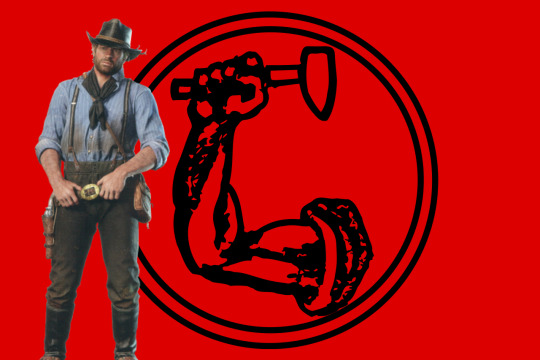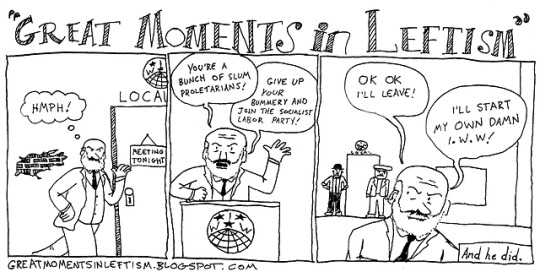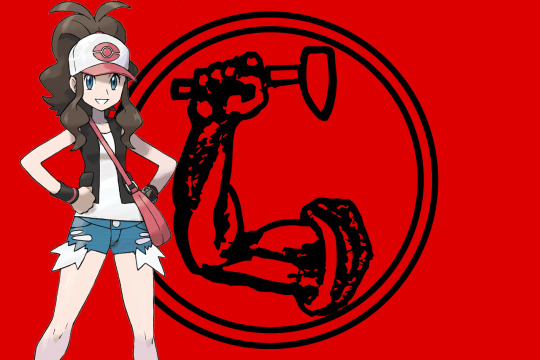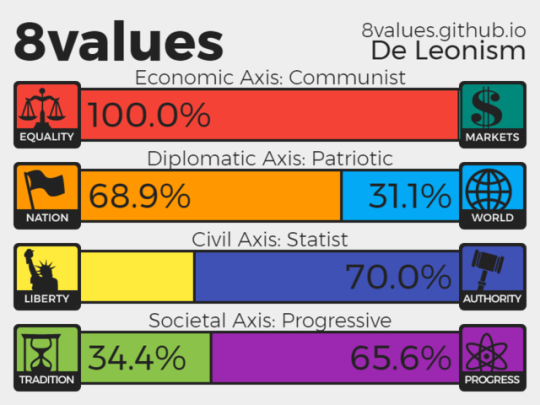#de leonism
Text

Arthur Morgan from the Red Dead series is a De Leonist!
23 notes
·
View notes
Text

Happy birthday, Daniel De Leon! (December 14, 1852)
Born in Caracas, Daniel De Leon studied extensively in Europe before attending and graduating from Columbia in 1878. Working for a time as an attorney, he settled in New York and became involved in socialist politics, joining the Socialist Labor Party, the oldest socialist party in America. Coming to lead the SLP, De Leon began writing and theorizing, moving away from his original Georgist positioning to establish his own strain of Marxism known as De Leonism, which emphasized the need for the working class to organize on political and economic lines through a revolutionary political party and a general union of all workers. A founder of the Industrial Workers of the World, De Leon split from the IWW over its opposition to electoral politics, and formed his own rump IWW in Detroit. De Leon and his works have been influential to a great number of notable Marxists, including Eugene Debs, James Connolly, Antonio Gramsci, and Vladimir Lenin. He died in 1914.
"It can be said that, whatever good there is in the various social panaceas—in 'welfare work,' 'social service,' municipal beautification, tenement house and factory improvement—has been achieved largely through the pressure brought to bear upon capitalism by socialism. The necessity for quieting and suppressing dissatisfaction favorable to socialist agitation is always present with the capitalist class."
95 notes
·
View notes
Text
75 notes
·
View notes
Note
If it weren’t for MLs your stupid ass wouldn’t have a communism to fuck up with an ‘Anarcho’ prefix, dipshit
anarchism predates leninism by a good while. Marxist communism and anarchist communism developed at roughly the same time, with both having intelectual predecessors going back hundreds of years.
Not to mention, marxism of a libertarian characteristic itself predates leninism by generations, magonism and deleonism for examples. De Leonism while it is fairly antiquated does have a respectable intellectual legacy. Magonism on the other hand does have some currently active polites. And that's just restricting ourselves to marxism!
Leninism is a subsection of a subsection of communism that came about after anarchist communism already had decades of ideological development.
A libertarian communism that came before a more authoritarian one hardly owes anything to them, and they certainly didnt "ruin" communism.
There are a decent few ML's i respect. Good and sincere people id be proud to call comrade. But plenty ML's are not so great, unfortunately.
I hope you live well, my friend.
8 notes
·
View notes
Text
if i were a big streamer and didn't have family that could be harassed i would randomly during campaign season start backing some obscure political party or something. just like throw my weight behind the socialist labour party of america or something. de leonism will triumph
4 notes
·
View notes
Text
On The Far-Left, Effective Activism & Violence
Introduction to what it means to be on the far-left
So first off, as socialists & anarchists, we know we are far outside the Overton window. We know even if left-wing policy positions are more popular than right-wing, most people are still going to be biased to what they’ve grown up with and what’s familiar to them.
But, we also know we can shift the Overton window from the radical fringe: [1]
The most important thing about the Overton window, however, is that it can be shifted to the left or the right, with the once merely “acceptable” becoming “popular” or even imminent policy, and formerly “unthinkable” positions becoming the open position of a partisan base. The challenge for activists and advocates is to move the window in the direction of their preferred outcomes, so their desired outcome moves closer and closer to “common sense.”
There are two ways to do this: the long, hard way and the short, easy way. The long, hard way is to continue making your actual case persistently and persuasively until your position becomes more politically mainstream, whether it be due to the strength of your rhetoric or a long-term shift in societal values. By contrast, the short, easy way is to amplify and echo the voices of those who take a position a few notches more radical than what you really want.
For example, if what you actually want is a public health care option in the United States, coordinate with and promote those pushing for single-payer, universal health care. If the single-payer approach constitutes the “acceptable left” flank of the discourse, then the public option looks, by comparison, like the conservative option it was once considered back when it was first proposed by Orrin Hatch in 1994.
This is Negotiating 101.
So our hope is that our ideals and passion can be admired by some, like risking prison to sabotage the draft for Vietnam, so some peoples sons aren't conscripted into fighting an evil war. [2] Then any moderate left policies might look reasonable in comparison which makes them the tried and tested policies of the future.
We should also openly acknowledge that the ideal future we would like to see is empirically extremely unlikely to come about in our own lifetimes in the west, as there are still so many hills to climb first in pressuring workplaces over to a more co-operative flattened hierarchy of workplace democracy.
To quickly summarise, the direction the far-left would like to head in, is going from; a two party system, to... a multi-party coalition through preferential voting, to... some local government positions being elected by sortition, to… the majority of society being so content with worker-co-ops and syndicalist unions that we transition from representative democracy to direct democracy. So, a chamber of ministers to federated spokes councils.
Now I might be the minority in the far-left on this, but I would want people to have the option of going back a step if people aren't ready for that level of direct democracy, where the choice is disorganization and suffering or slightly less suffering under a repressive system of governance again. You could relate this to the position Rosa Luxemburg was in in lending support and hoping some good would come of the Spartacist uprising, whilst also wishing they could have been convinced to hold off until they were more prepared.
This is why it’s so important to build the governance model slowly enough to match expertise, so as not to falter with people pushing for ideals before having adequately put them to the test. So as not to cause a whiplash effect, where people desire a reactionary politics of conformity, under more rigid hierarchy of just the few.
-
As anarchists & socialists who desire a more directly democratic society, what tactics should we use if we want to be effective at moving society in that direction?
Electoral politics - We need to get really well educated on how even the baby step policies toward the left would be an improvement on where we are now, we need to learn the internal politicking of government and get good at having friendly arguments with comedy to appeal to friends and acquaintances basic intuitions.
The goal being that we can talk the latest news and (1) Win over conservatives to obvious empirically better policies on the left, and (2) Win over liberals when centre-left parties are in power to feel dismayed at the slow pace of change, and so acknowlege how much better it would be if there was a market socialist in the position willing to rally people to demonstrate and strike to push through bills.
Mutual aid – We should put the time into helping our neighbours and volunteering, for example on a food not bombs stall, to get people to see the positive benefits of a communalist caring society.
Theory – We should be educating ourselves and helping others know what work and rent union to join, what to keep a record of at work, how to defend yourself from rapists and fascists, how to crack a squat and how to write a press release, etc.
Campaigning – We should look for the easiest squeeze points to rack up small wins, like the picketing of a cafe to reclaim lost wages, so that word spreads and it creates a domino effect.
-
What tactics should we or shouldn’t we generally avoid in our political campaigns?
Civility as an end in itself
They’re not lies, they’re “falsehoods”; it’s not racism, it’s “racially charged comments”; it’s not torture, it’s “enhanced interrogation.” For years, U.S. media has prioritized, above all else, norms and civility.
Mean words or questioning motives are signs of declining civility and the subject of much lament from our media class. However, op-eds explicitly advocating war, invasion, sanctions, sabotage, bombing and occupation or cutting vital programs and lifelines for the poor are just the cost of doing business. What’s rhetorically out of bounds - and what isn’t - is far more a product of power than any objective sense of "civility" or “decency.”
Where did these so-called norms come from, who do they benefit, and why is their maintenance–-even in the face of overt white nationalism––still the highest priority for many liberals and centrists in U.S. media? [3]
This is so important to challenge, and yet incredibly nuanced. So, it is obviously a great success that the rate at which people would go around hurling racist insults looks to have dropped in favour of more political correctness.
It is also true that in pursuit of political correctness and an ethic of care, we can look for simplistic niceness, to the detriment of being able to identify systems of oppression. We need to be able to refuse the emotional labor of treating our bosses as friends when we have no desire to be friends with them. [4]
Similarly in our everyday interactions, we need to encourage our friends to accept us for who we are or not to accept us at all, so as to create deeper connections which builds stronger communities: [5]
It can be annoying or hurtful when others presume they know everything about you. But rather than assert their wrongness and make them defensive, you can acknowledge it as a common human failing and find creative ways to hold a mirror up to what life experiences they’ve had that lead them to jump to those conclusions.
One way is a kind of playful authenticity, telling a lie about a lie, to get back closer to the truth. So don’t outright challenge the idea, but don’t live up to it either, in fact live down to it. Playfully undermine the idea by failing to live up to the glamour of what it would mean to be that person, then find a way of revealing that it was a misunderstanding all along, so they needn’t worry about it applying to you.
Media Chasing – We shouldn’t chose our actions for the primary purpose of provoking conversations because it is insincere to ones own desires to materially affect change and it’s recognised as such by those who hear about it.
Transparency – We should be transparent with our supporters in all we hope to achieve and how successful we are being at achieving that task, so as not to attract funds for labor we haven’t and aren’t likely to be able to do.
Civil Disobedience – Whether it be breaking the law without causing any damage or economic sabotage and political violence which we’ll talk about later, anarchists hope to chose the right actions to provoke conversations and materially challenge unethical industries and actors, so as to push electoral politics towards direct democracy and eventually consolidate our gains in a revolution.
Fascists will also use tactics from civil disobedience to political violence, and tend toward violence against people for people holding ideas as the things they hate, rather than the lefts systemic critique of material conditions. All in the hopes of pushing society towards a more authoritarian constitutional republic, before seizing power in a palace coup and attempting to rule as a sequence of dictators for life.
It is up to the left to try and counter this violence by doxxing, making their rallies miserable, etc. And it is up to everyone to decide which government to vote in, to enact what degree of punishment to bring down on people breaking the law on either side.
Any direction the society goes in for either not controlling or bowing to which protesters demands is still the moral culpability of the government and those who participated in the party political process.
There simply is an obvious legal and moral difference between for example victimless civil disobedience on the left aimed at all people being treated equally in society like collecting salt from the sea or staying seated on the bus, to the type of violence you see on the right, like Israeli settlers throwing people off their land with arson attacks, stealing another country’s resources against international law.
But again, it is true that to whatever degree anarchists chose bad targets optically, we do to some degree bring the slow pace of change on ourselves by handing the right an advocacy win.
Graffiti & Culture Jamming – Whether it be an artistic masterpiece that no one asked for or altering a billboard to say something funny and political, instead of the advert that was there before pressuring you to consume more and more, most people can be won over by this as a good form of advocacy. Just don’t practice tagging your name a million times over every building in town.
Hacking – Obviously most people agree whistle-blowing war crimes is a yay. Selectively releasing documents to help conservatives win elections however, is a nay.
Sabotage – We should chose targets which have caused people the most amount of misery, for which people can sympathise most, like the sabotaging of draft cards I wrote about at the beginning. So causing economic damage to affect material conditions and make a statement.
We also need to carefully consider the difference between property which is personal, luxury, private, government owned and co-operatively worker owned.
So, it could be seen as ethical to chose material targets of evil actors in order to cause economic damage and make a statement, so long as in the case of personal property, the item has no sentimental value and can be replaced because the person is wealthy. Or is a luxury item that was paid for through the exploitation of others labor. Or is private property, meaning the means of production which should be owned collectively anyway.
It’s an expression of wanting to find an outlet for legitimate anger against that which causes us suffering. For example, if taking the risk to slash slaughterhouse trucks’ tires in the dead of night is how you develop stronger bonds with a group of people and gain the confidence to do amazing things like travel the world and learn from other liberation struggles.
Fighting – First off, I think propaganda by the deed, physically hurting people for the purpose of making a political statement is evil, as it runs counter to our philosophy on the left that material conditions create the person and so we should make every peaceful effort to rehabilitate people.
However, to the extent that some current institutions fail to rehabilitate people and the process of seeking justice through these institutions can cause more trauma, then personal violence to get to resolve feelings of helplessness in the face of evil acts can be an ethical act.
For example survivor-led vigilantism: [4]
“I wanted revenge. I wanted to make him feel as out of control, scared and vulnerable as he had made me feel. There is no safety really after a sexual assault, but there can be consequences.” -Angustia Celeste, “Safety is an Illusion: Reflections on Accountability”
Two situations in which prominent anarchist men were confronted and attacked by groups of women in New York and Santa Cruz made waves in anarchist circles in 2010. The debates that unfolded across our scenes in response to the actions revealed a widespread sense of frustration with existing methods of addressing sexual assault in anarchist scenes. Physical confrontation isn’t a new strategy; it was one of the ways survivors responded to their abusers before community accountability discourse became widespread in anarchist circles. As accountability strategies developed, many rejected physical confrontation because it hadn’t worked to stop rape or keep people safe. The trend of survivor-led vigilantism accompanied by communiqués critiquing accountability process models reflects the powerlessness and desperation felt by survivors, who are searching for alternatives in the face of the futility of the other available options.
However, survivor-led vigilantism can be a valid response to sexual assault regardless of the existence of alternatives. One doesn’t need to feel powerless or sense the futility of other options to take decisive physical action against one’s abuser. This approach offers several advantages. For one, in stark contrast to many accountability processes, it sets realistic goals and succeeds at them. It can feel more empowering and fulfilling than a long, frequently triggering, overly abstract process. Women can use confrontations to build collective power towards other concerted anti-patriarchal action. Physical confrontation sends an unambiguous message that sexual assault is unacceptable. If sexual violence imprints patriarchy on the bodies of women, taking revenge embodies female resistance.
Other examples we can think of are personally desiring to fight fascists in the street to block them from marching through immigrant communities. To pushing your way through huntsman to save a fox from getting mauled to death by dogs.
-
Political killing
I’ll work through hypotheticals from circumstances relevant to the past, present and future, then talk through the ethics of each.
-
Past possibilities
Most people agree anyone who took it upon themselves to assassinate Hitler a day before the break out of WW2 would be seen as committing an ethical act, no matter who follows, because throwing a wrench into the cult of personality spell built around Hitler would be a significant set back for the fascist state’s grip over the people. And given all the evidence pointing to the inevitability of war, such an act could easily be seen as a necessary pre-emptive act.
-
Present possibilities
Most can sympathise with quick revolutions against dictatorships where the result is a freer society, like the Kurdish uprising in Northern Syria which took power from a regime who had rolled tanks on demonstrators and outlawed teaching of their native language.
But, even there, there are key foundations you need to work from, like the probability you won’t just give an excuse for the oppressor committing even worse horrors as was the case with the Rohingya militants who ambushed a police checkpoint, resulting in army & citizen campaign to burn down many villages, plus murder and rape those that couldn’t get away.
As well as a responsibility to put down arms after winning political freedoms and a majority are in favour of diplomacy through electoral politics, like in Northern Ireland today.
Under representative parliamentary systems, the sentiment of most is that even if it could be argued that a war of terror against the ruling class was the easiest route to produce a better society, that it would still be ethically wrong to be the person who takes another’s life just because it’s the easiest way. Since regardless of manufactured consent or anything else you still could have worked to build a coalition to overcome those obstacles and change the system slowly from within.
And I agree, it would be an act of self-harm to treat life with such disregard when you could have been that same deluded person shrouded in the justificatory trappings of society treating your behaviour normally. I don’t think the way we win today is treating a cold bureaucratic system with equally cold disregard in whose life we had the resources to be able to intimidate this week. Time on earth is the greatest gift people have, to make mistakes and learn from them.
So then, an easy statement to make on life under representative parliamentary systems is; outside of absurdly unrealistic hypotheticals, I could never condone purposefully killing others when campaigning against such monoliths as state and corporate repression today.
Breaking that down though; what do I mean by an unrealistic hypothetical? For example the philosophical thought experiment called the trolley problem, where you have a runaway trolley hurtling towards 5 people tied to a track, and you can pull a leaver so the train changes tracks and only kills 1 person tied to a track. Or you can change it to 7 billion to 1 even. Or 7 billion of your average citizens vs. 1 million unethical politicians, police and bosses, to make it political.
Now what do I mean by purposeful, well we can think of for example the most extreme cases of post-partum psychosis which has mothers killing their babies. But more nuanced than that, the rape victim who gets worn down by their abuser for years until they have a psychological break and kill.
That does still leave a lot of lee way for people knowingly taking risks with others lives, not intending to kill, but who are reckless in their actions, such as with some forms of economic sabotage. And I agree such a reckless act would bring up feelings of revulsion for all kinds of reasons like questioning whether the person was really doing it to help people or for their own ego-aggrandizement. All that can be hoped is a person makes a careful accounting of their ability for human error and weighs it against the outcomes of doing nothing.
-
Future possibilities
We can hypothesise the unrealistic case of 99% of society desiring a referendum on a shift from parliamentary representative system to a federated spokes council system and the MPs dragging their feet, the same way both parties gerrymander the boundaries to make it easier to win despite it being the one issue most everyone agrees is bad, and people needing to storm the halls of power to force a vote to happen.
More likely though, an opportunity for revolution might arise from such a confluence of events as climate refugees and worker gains forcing the state and corporations into trying to crack down on freedoms in order to preserve their power and enough people resisting that move, who are then able take power and usher in radical policy change, with either the army deciding to stand down or splitting into factions.
-
References
1. Beautiful Trouble: A Toolbox for Revolution - Use your radical fringe to shift the Overton window P. 215.
2. The Camden 28 - The Camden 28 were a group of Catholic left anti-Vietnam War activists who in 1971 planned and executed a raid on a Camden, New Jersey draft board. The raid resulted in a high-profile criminal trial of the activists that was seen by many as a referendum on the Vietnam War and as an example of jury nullification.
3. Citations Needed Podcast - Civility Politics
4. Slavoj Žižek: Political Correctness is a More Dangerous Form of Totalitarianism | Big Think
5. A Love Letter To Failing Upward
6. Accounting for Ourselves - Breaking the Impasse Around Assault and Abuse in Anarchist Scenes.
-
#politics#far-left#advocacy#pragmatic#direct action#anarchism#anarchist#socialism#socialist#left communist#left communism#council communism#democratic confederalism#de leonism#rojava#crimethinc#antifa#antifascist#sabotage#animal liberation front#earth liberation front#veganarchist#veganarchism#revolution#reform
8 notes
·
View notes
Photo

“he couldn’t say ‘with blackjack and hookers’ because they already had that covered”
46 notes
·
View notes
Audio
Left and Lefter Episode 3: Question and Answer Special 1
In the first question-and-answer special of Left and Lefter, Alice and Brett take your questions and give you their answers. Topics range from gun control to landlords, leftist organizations, and De Leonism.
59 notes
·
View notes
Photo

this is a leaked image from the Reds! A Revolutionary Timeline universe
11 notes
·
View notes
Quote
I do not deny that Socialists often leave the church. But why do they do so? Is their defection from the church a result of our attitude towards religion; or is it the result of the attitude of the church and its ministers toward Socialism?
Let us take a case in point, one of those cases that are being paralleled every day in our midst. An Irish Catholic joins the Socialist movement... He looks around and he finds the press full of reports of crimes, murders, robberies, bank swindlers, forgeries, debauches, gambling transactions, and midnight orgies in which the most revolting indecencies are perpetrated. He investigates and he discovers that the perpetrators of these crimes were respectable capitalists, pillars of society, and red-hot enemies of Socialism, and that the dives in which the highest and the lowest meet together in a saturnalia of vice contribute a large proportion of the campaign funds of the capitalist political parties.
Some Sunday he goes to Mass as usual, and he finds that at Gospel the priest launches out into a political speech and tells the congregation that the honest, self-sacrificing, industrious, clean men and women, whom he calls 'comrades,' are a wicked, impious, dissolute sect, desiring to destroy the home, to distribute the earnings of the provident among the idle and lazy of the world, and reveling in all sorts of impure thoughts about women.
And as this Irish Catholic Socialist listens to this foul libel, what wonder if the hot blood of anger rushes to his face, and he begins to believe that the temple of God has itself been sold to the all desecrating grasp of the capitalist?
While he is yet wondering what to think of the matter, he hears that his immortal soul will be lost if he fails to vote for capitalism, and he reflects that if he lined up with the brothel keepers, gambling house proprietors, race track swindlers, and white slave traders to vote the capitalist ticket, this same priest would tell him he was a good Catholic and loyal son of the church.
At such a juncture the Irish Catholic Socialist often rises up, goes out of the church and wipes its dust off his feet forever. Then we are told that Socialism took him away from the church. But did it? Was it not rather the horrible spectacle of a priest of God standing up in the Holy Presence lying about and slandering honest men and women, and helping to support political parties whose campaign fund in every large city represents more bestiality than ever Sodom and Gomorrah knew?
These are the things that drive Socialists from the church, and the responsibility for every soul so lost lies upon those slanderers and not upon the Socialist movement.
James Connolly (Socialism Made Easy)
#socialism#religion#catholicism#religous socialism#james connolly#ireland#irish republicanism#irish socialism#de leonism#catholic socialism#socialism in ireland#irish catholicism#atheism
7 notes
·
View notes
Text

Hilda from the Pokemon series is a De Leonist!
22 notes
·
View notes
Photo

Happy birthday, James Connolly! (June 5, 1868)
Born in the Irish ghetto of Cowgate in Edinburgh, James Connolly became a laborer at a young age, and joined the British Army to improve his prospects. However, he developed a hatred for the institution which he would hold his entire life, and eventually deserted. Becoming influenced by the writings of Karl Marx and Friedrich Engels, Connolly came to identify as a socialist, and would become one of the leading figures in the socialist republican movement in Ireland, and a socialist theorist in his own right. In Ireland, he would become a leader in both the Irish Socialist Republican Party and the Labour Party, which he helped to found. Associated with the syndicalist current known as De Leonism, Connolly spent some time in the United States where he affiliated with the Socialist Labor Party and helped to found the Industrial Workers of the World and the Irish Socialist Federation. Returning to Ireland, he was a leader along with Jim Larkin in the Irish Transport and General Workers' Union, and continued to agitate for Irish independence and a socialist republic. He was a leader in the Easter Rising of 1916, commanding the Dublin Brigade. The rebellion was crushed, and Connolly captured, with his execution coming soon afterward. He has become a national hero in Ireland, with numerous statues and memorials erected to honor his memory and legacy. His dream of an Irish republic united in socialism remains, for now, unfulfilled.
“Revolution is never practical – until the hour of the revolution strikes. Then, it alone is practical, and all the efforts of the conservatives, and compromisers become the most futile and visionary of human imaginings.”
324 notes
·
View notes
Text
you've heard of esoteric hitlerism but what about other such esoteric ideologies? esoteric juche. esoteric justicialism. esoteric de leonism.
1 note
·
View note
Text
If the most control of the capitalist state can do is get the army and police to stand down that can mean a hell of a lot when the time comes.
5 notes
·
View notes
